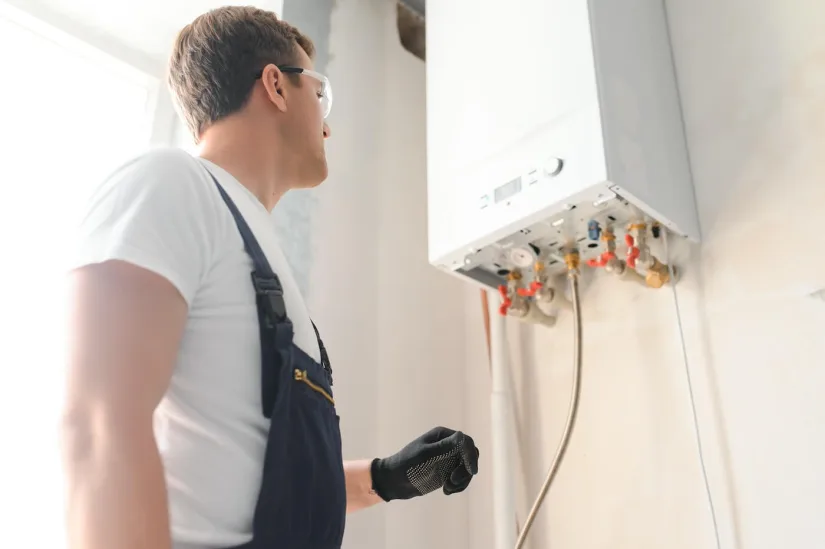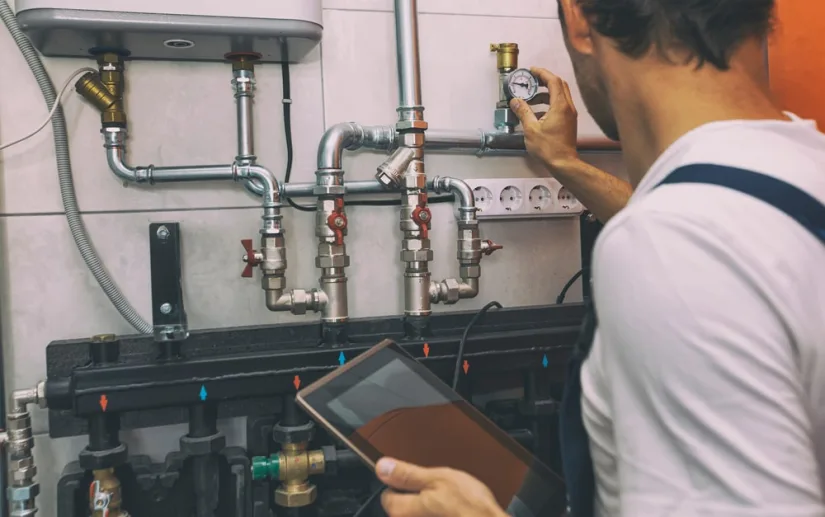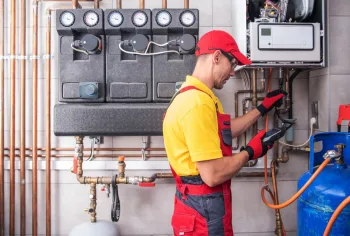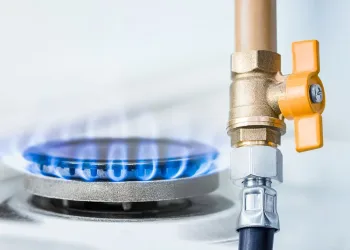
Natural gas and propane are integral to many commercial operations, powering boilers, furnaces, cooking ranges, and industrial appliances. While essential, these fuels pose a significant risk when they escape containment, as gas leaks can lead to catastrophic consequences.
Leaks can result in fires or explosive hazards, cause health issues, and even contribute to long-term environmental damage. When it comes to gas safety, “good enough” isn’t enough. Call a gas plumber to schedule an inspection, install smart monitoring, or bolster your gas system against potential leaks.
What Is a Gas Leak?
A gas leak occurs when pressurized gas escapes from a fault in the piping or appliance interfaces. Even minor breaches can allow gas to sequester in confined spaces. Natural gas is extremely flammable, and when mixed with air at concentrations between 5% and 15%, it creates an explosive atmosphere.
Moreover, the additives that give gas its “rotten egg” smell indicate a potential hazard. The longer the leak persists, the more gas accumulates, escalating the risk of ignition or health impacts such as asphyxiation and organ damage.
Common Signs of Gas Leaks
Early detection is critical. Here are some of the most recognizable signs:

Distinctive Odor
Odorized gas smells like sulfur or rotten eggs due to mercaptan additives. However, accumulation may occur in hidden corners of warehouses, basements, or mechanical closets where the scent is harder to detect.
Hissing Sound
A steady hiss near gas lines, meter fittings, or appliance connections often indicates pressurized gas escaping. This may occur when a valve is loose or a seal is failing.
Discolored or Dead Vegetation
For buried lines, gas can kill plant life overhead. Brown or wilted patches of grass near known gas paths may reveal a concealed leak.
Reactive Pilot Lights & Flame Instability
Gas burner flames that are spinning, lifting off, or turning orange can signal an imbalanced mixture caused by low gas pressure or partial leaks.
Bubbles Around Lines or Fittings
Applying a soap-and-water solution to suspected leak areas helps reveal small leaks through visible bubbles.
Unplugged Noises or Pressure Drops
If multiple appliances shut off with a roaring sound or a meter reading drops suddenly, it may indicate a sizable gas pressure loss.
Health Symptoms to Watch For
Gas exposure produces physical symptoms ranging from mild discomfort to severe illness:
- Headaches, Dizziness, Nausea
- Eye, Nose, and Throat Irritation
- Fatigue or Confusion
- Shortness of Breath or Coughing
- Chest Pain, Arrhythmia (severe cases)
- Loss of Consciousness (extreme exposure)
Facility operators must stay alert, especially if several occupants report similar discomfort in an otherwise healthy area with a natural gas line or gas appliances.
What to Do If You Suspect a Gas Leak
If you smell gas or notice a natural gas odor, generally with a distinctive smell of a rotten egg or sulfur smell due to an odorant called mercaptan, you should take immediate action. Whether it is coming from a gas stove, gas furnace, or water heater, a persistent smell could signal a leak.
Sometimes, signs like blowing dirt near gas lines may accompany the odor. It is wise to use a natural gas detector and ensure your carbon monoxide detectors are functioning. If you suspect a leak or smell natural gas, evacuate the area promptly and contact professionals without delay to ensure your safety.
Here the key steps you should take:
Evacuate Immediately
Stop operations, power down equipment, and clear the area. Do not use electronics or switches that could spark.
Do Not Re-enter
Do not attempt inspections or repairs to fix the leaking gas. Even your smartphone or flashlight could ignite gas vapor.
Shut Off Main Gas Valve
If accessible outside, close the valve using the T-handle. Inside, a qualified technician should do it during inspection.
Call Authorities
Contact 911 or the local fire department and alert your gas supply company immediately.
Ventilate
If safe and gas concentration is low, open windows/doors to disperse gas, but only after evacuation.

Wait for the “All Clear”
Do not resume operations or re-enter until gas service professionals have tested and confirmed safety.
Regular Inspections and Maintenance
Vigilance is the best defense against a natural gas leak. Take the following measures:
- Biannual Gas System Inspections: Commercial gas lines and appliances should undergo semi-annual exams using pressure gauges, tracer gas, or ultrasonic tools.
- Electronic Leak Detectors: Deploy handheld or fixed gas sensors in mechanical rooms, near meters, and high-risk zones.
- Appliance Tune-ups: Clean and adjust burners, pilot lights, and internal regulators to ensure proper gas flow.
- Regulator Calibration: High-performing regulators maintain correct upstream and downstream pressures; aged ones should be tested and replaced proactively.
- Smart Monitoring: Install smart control panels that flag abnormal pressure fluctuations or concentration spikes.
How Our Experienced Gas Plumbers Can Help You
At Coastal Commercial Services, we understand that gas system safety is foundational to commercial operations. We offer a comprehensive service portfolio designed to safeguard your facility at every stage from prevention to emergency resolution.
Advanced Leak Detection & Inspection
- Schedule-Based Audits: We offer bi-annual on-site inspections using flame ionization and ultrasonic leak detectors.
- Smart Telemetry Integration: We can equip your site with real-time gas pressure monitors that trigger alerts on abnormalities.
- Piping Integrity Scanning: We conduct non-invasive surveys of underground and overhead piping with trace gas and thermographic techniques.
Rapid Emergency Response
- 24/7 Dispatch: Technicians are on-call around the clock, with typical arrival times under 90 minutes.
- Urgent Containment Measures: We install temporary gas caps, mist-lingering pressure relief, and provide safe evacuation instructions.
- Emergency Valve Isolation & Ventilation: Professionals isolate the leak, ventilate the space, and maintain ignition barriers and hot zones.
Precision Repair & Replacement
- Commercial-Grade Materials: We use heavy-walled black-iron pipe, CSST, and approved fittings.
- Code-Compliant Techniques: We execute repairs following NFPA 54, local authority provisions, and utility requirements.
- Industrial Flame Inspection: We calibrate burner flames for optimal oxygen-fuel mix, removing carbon deposition and ensuring efficiency.
Regulator Replacements & Calibration
- Premium Regulator Selection: We install high-capacity, adjustable, multi-stage regulators with redundancy for safety.
- Manufacturer-Specified Calibration: Regulators are set to match appliance input ratings, reducing blow-offs or starvation risk.
- Pilot Ignition Assurance: We verify stable pilot operation under simulated demand and ripple pressure conditions.
Preventive Maintenance Contracts
- Monthly, Quarterly, Annual Plans: Flexible service packages that include inspections, calibrations, minor repairs, and digital record-keeping.
- Maintenance Logs: Assessment findings, repair notes, and pressure trends are tracked in secure databases, ready for audits.
- Proactive Replacement Recommendations: We advise preemptive replacements for aging regulators, pipes with corrosion risk, and sensors using predictive failure analysis.
Economical Data-Driven Upgrades
- Smart Meter Installation: We can integrate smart gas meters with SCADA systems for centralized monitoring and alerts.
- Cross-Utility Consultation: Support across electric, water, and gas utilities to ensure smooth installation and regulatory coverage.
- Meter-to-Appliance Balancing: Systems are fine-tuned to match load profiles for all appliances, avoiding pressure sag during peak activity.
Regulatory Compliance & Certification
- Full Documentation: We provide emergency repair reports, calibration certificates, meter performance logs, and compliance audits.
- Authority Liaison: We may handle utility notifications, metering re-commissioning, and safety certificate handoff.
- Insurance Collaboration: Comprehensive logs and documentation can support claims or assessments related to gas-related disruptions.
Choose Our Proven Gas Plumbing Team for Repair, Maintenance, and Installation
Coastal Commercial Services offers a full-spectrum solution for everything from emergency services to pressure monitoring, from staff training to smart systems integration. Protect your people, protect your facility, and protect your bottom line by entrusting your gas system safety to experienced professionals. To schedule your service, call us at (772) 248-0490 or contact us online.



